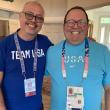Elliot’s and Byron’s Most Excellent Olympic Adventure
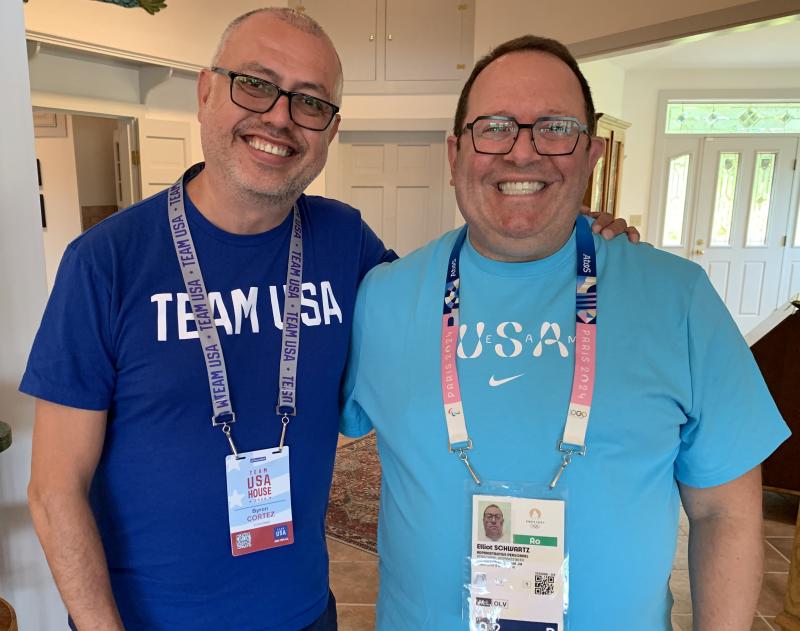 Elliot Schwartz, right, works for the U.S. Olympic and Paralympic committee and was part of an 11,000-plus delegation to the 2024 Paris Games. His spouse, Byron Cortez, accompanied him to Paris as an Olympic volunteer and worked at Team USA House during the Games. BILL PEARSON/Boothbay Register
Elliot Schwartz, right, works for the U.S. Olympic and Paralympic committee and was part of an 11,000-plus delegation to the 2024 Paris Games. His spouse, Byron Cortez, accompanied him to Paris as an Olympic volunteer and worked at Team USA House during the Games. BILL PEARSON/Boothbay Register
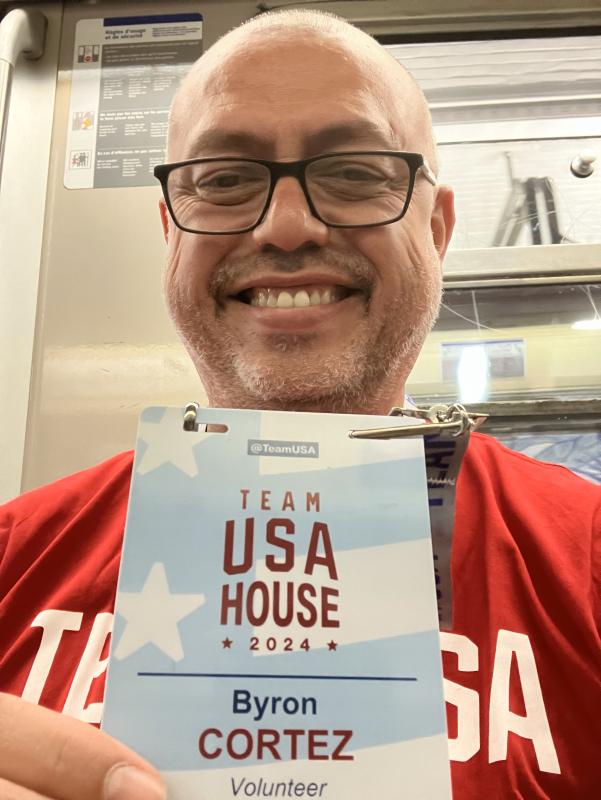 Byron Cortez displays his official credential as a volunteer for the U.S. Olympic Committee during the Paris 2024 Games. Cortez worked at Team USA House which had restaurants, shops, bars and viewing sections to watch the Games for visiting VIPs, athletes, sponsors and committee members. Courtesy photo
Byron Cortez displays his official credential as a volunteer for the U.S. Olympic Committee during the Paris 2024 Games. Cortez worked at Team USA House which had restaurants, shops, bars and viewing sections to watch the Games for visiting VIPs, athletes, sponsors and committee members. Courtesy photo
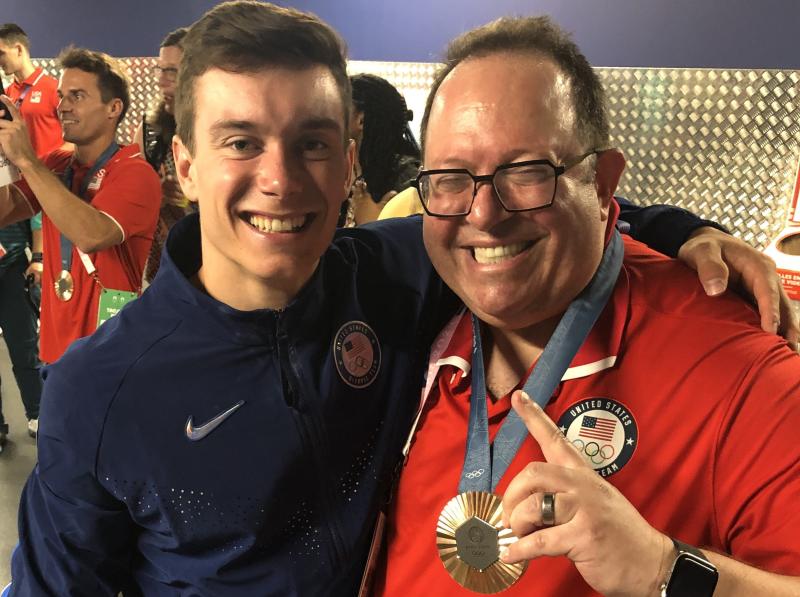 Elliot Schwartz of East Boothbay shares a special moment with U.S. gymnast Brody Malone at the 2024 Paris Olympics. Malone placed his bronze medal on Schwartz’s neck following the ceremony. Courtesy photo
Elliot Schwartz of East Boothbay shares a special moment with U.S. gymnast Brody Malone at the 2024 Paris Olympics. Malone placed his bronze medal on Schwartz’s neck following the ceremony. Courtesy photo
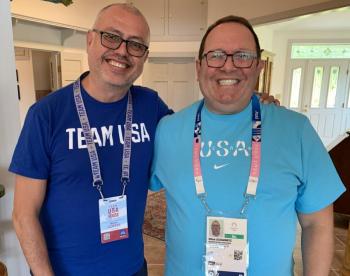 Elliot Schwartz, right, works for the U.S. Olympic and Paralympic committee and was part of an 11,000-plus delegation to the 2024 Paris Games. His spouse, Byron Cortez, accompanied him to Paris as an Olympic volunteer and worked at Team USA House during the Games. BILL PEARSON/Boothbay Register
Elliot Schwartz, right, works for the U.S. Olympic and Paralympic committee and was part of an 11,000-plus delegation to the 2024 Paris Games. His spouse, Byron Cortez, accompanied him to Paris as an Olympic volunteer and worked at Team USA House during the Games. BILL PEARSON/Boothbay Register
 Byron Cortez displays his official credential as a volunteer for the U.S. Olympic Committee during the Paris 2024 Games. Cortez worked at Team USA House which had restaurants, shops, bars and viewing sections to watch the Games for visiting VIPs, athletes, sponsors and committee members. Courtesy photo
Byron Cortez displays his official credential as a volunteer for the U.S. Olympic Committee during the Paris 2024 Games. Cortez worked at Team USA House which had restaurants, shops, bars and viewing sections to watch the Games for visiting VIPs, athletes, sponsors and committee members. Courtesy photo
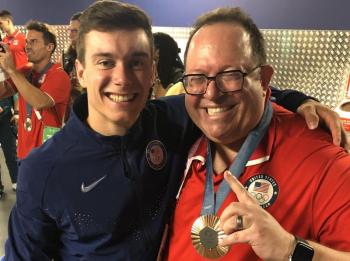 Elliot Schwartz of East Boothbay shares a special moment with U.S. gymnast Brody Malone at the 2024 Paris Olympics. Malone placed his bronze medal on Schwartz’s neck following the ceremony. Courtesy photo
Elliot Schwartz of East Boothbay shares a special moment with U.S. gymnast Brody Malone at the 2024 Paris Olympics. Malone placed his bronze medal on Schwartz’s neck following the ceremony. Courtesy photo
What began as a passion for figure skating led an East Boothbay man all the way to the 2024 Paris Olympics. Elliot Schwartz, 57, began figure skating as an MIT (Massachusetts Institute of Technology) student. He joined a skating club, and soon discovered he was “the world’s worst adult skater.” But what Schwartz lacked in talent was made up for in his passion for figure skating. Eventually that passion led him into the world of competitive figure skating judging.
In 1999, he began as a figure skating official and data operator. For the past 10 years, he has judged figure skating competitions. He currently judges competitions ranging from “cute little kids” to the International Skating Union’s World Championships. He has judged events in the U.S., Europe and China. In March, he will be a judge at the world championships in Boston. “What I do is provide technical assistance to see if the skater performed their jumps correctly by reviewing video replays and relaying the information for scoring,” he said.
Judging is Schwartz’s hobby. His “day job” for the past four years has been in performance innovation for the U.S. Olympic and Paralympic committees. During the Paris Olympics, he worked with U.S. teams involved in the acrobatic sports (gymnastics, diving and artistic swimming). The men’s gymnastics team won a medal for the first time since 2008. Schwartz worked with the team during the qualifying round and team final. Schwartz shared a special moment with them after the medal ceremony. “People were taking pictures, and Brody Malone put his bronze medal around my neck,” he said.
Schwartz arrived in Paris on July 24, two days before the opening ceremony, and left Aug. 11, a day after the closing ceremony. His spouse Byron Cortez, 55, accompanied him to Paris and worked in the Team USA House as a volunteer. The house hosts Team USA athletes, coaches, family members, friends and donors. Team USA House was in the historic Palais Brongniart, Paris’ former stock exchange commissioned in the early 19th century.
As a volunteer, Cortez worked one of two shifts: 11 a.m. to 6 p.m. or 5 p.m. to 11 p.m. Team USA House had restaurants, shops, bars and viewing sections to watch the games. “We assisted the guests,” Cortez said. “We are instructed not to interact with the athletes so they can focus on their events.”
Cortez did have opportunities to interact with a few former Olympic champions. Carl Lewis won nine Olympic gold medals in four past Olympics and visited Team USA House. “He was friendly to everyone there. He spoke to them, and took selfies with anyone who asked,” he said.
Schwartz also put in his share of long days. He met with the sport performance team at 8 a.m. each day to review past athlete performances and plan for upcoming competitions. Schwartz described the meetings as “problem-solving” exercises and for providing logistical support. “In my case, I was going to many events providing analytical support to our teams and observing the competitions. At night, I would write previews for the next day and send emails to organizational leadership and donors. In some cases, the analysis guides decisions regarding a routine’s difficulty.”
Cortez doesn’t follow sports or athletic events on a regular basis, but he did enjoy his time at his first Olympics. He viewed several events on television in Team USA House. He also attended the Women’s 59kg weightlifting and volleyball. “It was spectacular,” he said. “The weightlifting moves very fast. The winner weighs 59kg and lifted 138 kg. It was an amazing thing to see.”
In the 59kg women’s competition, Luo Shifang of China won the gold medal. Maude Charron of Canada won the silver. Kuo Hsing-Chun of Chinese Taipei won the bronze. The medal ceremony followed. “You witness the pinnacle of somebody’s life and attending a medal ceremony is a truly transformative event,” Cortez said.
The next Olympics is the Winter Games in Milan, Italy in 2026. Los Angeles is the host for the 2028 Summer Games. Schwartz and Cortez would both like to participate in those. “I’d hope to fill a similar role there,” Elliott said of the Milan Winter Olympics. “I don’t know yet. There are fewer events, and the U.S. delegation is like 4,000-plus instead of the 11,000-plus for the Summer Games.”
Schwartz worked in a position created by the USOC for the Paris Games, and he isn’t sure if it will return in future games. “The position was created in support of team performance and a director at USOPC (United States Olympic and Paralympic Committee) made the case for me this time around,” he said.
Schwartz returned home after the Olympics for a short stay. He is heading to New York for a singles and pairs competition the first week of September. He described the competition as “a part of a national qualifying event for international competitions.” Once Schwartz returns home, again, he has specific plans. Schwartz is going to re-watch the Paris Olympics. “I’m really anxious to watch and see what NBC had to say,” he said.
Schwartz also has information about the 2028 Los Angeles Games. Baseball will return as a demonstration sport. It will replace “Breaking” (break dancing). “The Olympics wanted to attract a younger audience with breaking. It’s a shame it didn’t get more coverage,” he said. “I’ve seen competitive breaking, and it’s a lot of fun.”




